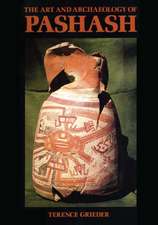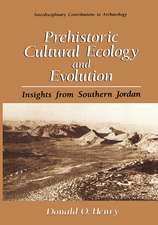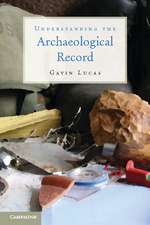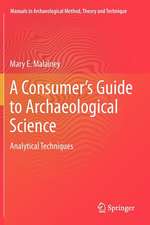Times of Neolithic Transition along the Western Mediterranean: Fundamental Issues in Archaeology
Editat de Oreto García-Puchol, Domingo C. Salazar-Garcíaen Limba Engleză Paperback – 31 mai 2018
This volume is organized into five sections:
· new discoveries and new ideas about the Mediterranean Neolithic · reconstructing times and modeling processes
· landscape interaction: farming and herding · dietary subsistence of early farming communities
· human dispersal mechanisms and cultural transmission This volume will also provide new empirical data to help readers assess different theoretical frameworks and narratives which underlie the models proposed to explain the expansion of farming from the Middle East into Europe.
| Toate formatele și edițiile | Preț | Express |
|---|---|---|
| Paperback (1) | 506.79 lei 3-5 săpt. | |
| Springer International Publishing – 31 mai 2018 | 506.79 lei 3-5 săpt. | |
| Hardback (1) | 709.77 lei 6-8 săpt. | |
| Springer International Publishing – 10 iul 2017 | 709.77 lei 6-8 săpt. |
Preț: 506.79 lei
Preț vechi: 596.23 lei
-15% Nou
Puncte Express: 760
Preț estimativ în valută:
97.00€ • 105.40$ • 81.54£
97.00€ • 105.40$ • 81.54£
Carte disponibilă
Livrare economică 31 martie-14 aprilie
Preluare comenzi: 021 569.72.76
Specificații
ISBN-13: 9783319932170
ISBN-10: 3319932179
Pagini: 417
Ilustrații: XIII, 417 p. 89 illus., 68 illus. in color.
Dimensiuni: 155 x 235 mm
Greutate: 0.63 kg
Ediția:1st ed. 2017
Editura: Springer International Publishing
Colecția Springer
Seria Fundamental Issues in Archaeology
Locul publicării:Cham, Switzerland
ISBN-10: 3319932179
Pagini: 417
Ilustrații: XIII, 417 p. 89 illus., 68 illus. in color.
Dimensiuni: 155 x 235 mm
Greutate: 0.63 kg
Ediția:1st ed. 2017
Editura: Springer International Publishing
Colecția Springer
Seria Fundamental Issues in Archaeology
Locul publicării:Cham, Switzerland
Cuprins
Introduction: Current thoughts on the Neolithisation process of the Western Mediterranean (Domingo C. Salazar-García, Oreto García Puchol).- Chapter 1: The Neolithic transition: from the Eastern to the Western Mediterranean (Jean Guilaine).- Chapter 2: New approaches to the Neolithic Transition: the last hunters and first farmers of the western Mediterranean (Joaquim Juan-Cabanilles, Bernat Martí Oliver).- Chapter 3: Timing the Western Mediterranean last hunter-gatherers and first farmers (Oreto García-Puchol, Agustín Diez-Castillo, Salvador Pardo-Gordó).- Chapter 4:Alternative stories of agricultural origins: The Neolithic spread in the Iberian Peninsula (Salvador Pardo-Gordó, Sean M. Bergin, Joan Bernabeu Aubán, C. Michael Barton).- Chapter 5: Neolithic Human Societies and woodlands in the north-western Mediterranean region. Wood and charcoal analysis (Ernestina Badal, Yolanda Carrión, Lucie Chabal, Isabel Figueiral,Stéphanie Thiébault).- Chapter 6: Evidence for early crop management practices in the Western Mediterranean: latest data, new developments and future perspectives (Guillem Pérez Jordà, Leonor Peña-Chocarro, Jacob Morales Mateo, Lydia Zapata).- Chapter 7: Farming practices in the Early Neolithic according to agricultural tools: Evidence from La Draga site (North-eastern Iberia) (Xavier Terradas, Raquel Piqué, Antoni Palomo, Ferran Antolín, Oriol López, Jordi Revelles, Ramon Buxó).- Chapter 8: Farming with Animals: Domesticated animals and taxonomic diversity in the Cardial Neolithic of the Western Mediterranean (Sarah B. McClure, Martin Welker).- Chapter 9: Dietary practices at the onset of the Neolithic in the Western Mediterranean revealed using a combined biomarker and isotopic approach (Cynthianne Debono Spiteri, Italo M. Muntoni, Oliver E. Craig).- Chapter 10: A terrestrial diet close to the coast: A case study from the Neolithic levels of Nerja Cave (Málaga, Spain) (Domingo C. Salazar-García, Manuel Pérez Ripoll, Pablo García-Borja, Jesús F. Jordá Pardo, J. Emili Aura Tortosa).- Chapter 11:The Mesolithic-Neolithic transition in Europe: a perspective from ancient human DNA (Eva Fernández-Domínguez, Lucke Reynolds).- Chapter 12: Paths and Rhythms in the spread of agriculture in the Western Mediterranean: the contribution of the analysis of harvesting technology (Juan José Ibáñez-Estévez, Juan Francisco Gibaja Bao, Bernard Gassin, Niccolo Mazzucco).- Chapter 13: Spatial and temporal diversity during the Neolithic spread in the Western Mediterranean. The first pottery productions (Joan Bernabeu Aubán, Claire Manen, Salvador Pardo-Gordó).- Conclusion: The Revolution in Studies of the Neolithic Transition in the West Mediterranean (Stephen Shennan).
Notă biografică
Domingo C. Salazar-García
Oreto García Puchol
Textul de pe ultima copertă
The study of the Neolithic transition constitutes a major theme in prehistoric research. The process of economic change, from foraging to farming, involved one of the main transformations in human behavior patterns. This volume focuses on investigating the neolithization process at the periphery of one of the main routes in the expansion of the Neolithic in Europe: the Western Mediterranean region. Recent advances in radiocarbon dating, mathematical and computational models, archaeometric analysis and biomolecular techniques, together with new archaeological discoveries, provide novel insights into this topic.
This volume is organized into five sections:
· new discoveries and new ideas about the Mediterranean Neolithic · reconstructing times and modeling processes
· landscape interaction: farming and herding · dietary subsistence of early farming communities
· human dispersal mechanisms and cultural transmission This volume will also provide new empirical data to help readers assess different theoretical frameworks and narratives which underlie the models proposed to explain the expansion of farming from the Middle East into Europe.
This volume is organized into five sections:
· new discoveries and new ideas about the Mediterranean Neolithic · reconstructing times and modeling processes
· landscape interaction: farming and herding · dietary subsistence of early farming communities
· human dispersal mechanisms and cultural transmission This volume will also provide new empirical data to help readers assess different theoretical frameworks and narratives which underlie the models proposed to explain the expansion of farming from the Middle East into Europe.
Caracteristici
Discusses the expanison of farming at the beginning of the Neolithic in the Western and Central Mediterranean Highlights the most recent advances in archaeological and scientific research aimed at better understanding the neolithisation process in the Mediterranean Focuses on the Neolithic transition in the Western and Central Mediterranean regions Brings together different novel methods and techniques applied to research assessing the neolithisation of the Mediterranean
























